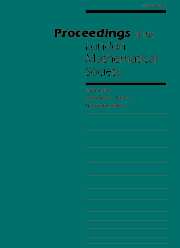Article contents
ON THE FREDHOLM ALTERNATIVE FOR THE p-LAPLACIAN IN ONE DIMENSION
Published online by Cambridge University Press: 06 March 2002
Abstract
We investigate the existence of a weak solution $u$ to the quasilinear two-point boundary value problem
(P) $$ - (|u'|^{p-2} u')' = \lambda_k |u|^{p-2} u + f(x) , \quad 0 < x < a ; \quad u(0) = u(a) = 0.$$
We assume that $1 < p < \infty$, $p \not= 2$, $0 < a < \infty$, and that $f \in L^1(0,a)$ is a given function. The number $\lambda_k$ stands for the $k$-th eigenvalue of the one-dimensional $p$-Laplacian. Let $\sin_p(\pi_p x/a)$ denote the eigenfunction associated with $\lambda_1$; then $\sin_p(k \pi_p x/a)$ is the eigenfunction associated with $\lambda_k$. We show the existence of solutions to (P) in the following cases.
(i) When $k=1$ and $f$ satisfies the orthogonality condition
$$\int_0^a f(x) \sin_p(\pi_p x/a) \, dx = 0,$$
the set of solutions is bounded.
(ii) If $k=1$ and $f_t \in L^1(0,a)$ is a continuous family parametrized by $t \in [0,1]$, with
$$\int_0^a f_0(x) \sin_p(\pi_p x/a) \, dx < 0 < \int_0^a f_1(x) \sin_p(\pi_p x/a) \, dx,$$
then there exists some $t^* \in [0,1]$ such that (P) has a solution for $f = f_{t^*}$. Moreover, an appropriate choice of $t^*$ yields a solution $u$ with an arbitrarily large $L^1(0,a)$-norm which means that such $f$ cannot be orthogonal to $\sin_p(\pi_p x/a)$.
(iii) When $k \geq 2$ and $f$ satisfies a set of orthogonality conditions to $\sin_p(k \pi_p x/a)$ and/or $\cos_p(k \pi_p x/a)$ on the subintervals $[ma/k, (m+1)a/k]$ (with $m = 0, 1, \dots, k-1$) and/or $[(m - \frac12 )a/k, (m + \frac12)a/k]$ (with $m = 1, 2, \dots, k-1$), again, the set of solutions is bounded.
(iv) If $k \geq 2$ and $\{ f_t \in L^1(0,a) : t \in [0,1] \}$ is a continuous family satisfying either
$$\int_0^a f_0(x) \sin_p(k \pi_p x/a) \, dx < 0 < \int_0^a f_1(x) \sin_p(k \pi_p x/a) \, dx$$
or another related condition, then there exists some $t^* \in [0,1]$ such that (P) has a solution for $f = f_{t^*}$.
Prüfer's transformation plays the key role in our proofs.
2000 Mathematical Subject Classification: primary 34B16, 47J10; secondary 34L40, 47H30.
Keywords
- Type
- Research Article
- Information
- Copyright
- 2002 London Mathematical Society
- 16
- Cited by


